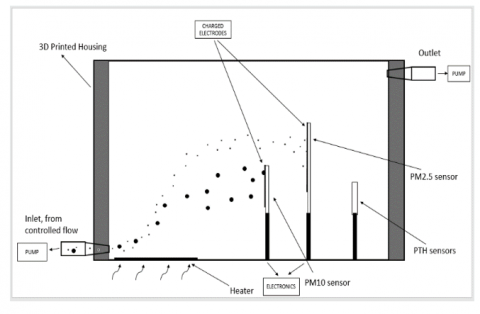
Submitted by Administrator on Tue, 05/02/2019 - 10:43
Sensor CDT Student, Pelumi Oluwasanya, and his supervisor, Dr Luigi Occhipinti (Department of Engineering, University of Cambridge), have been awarded an ESPRC IAA PDA grant. The project will run from 1 April to 30 September 2019.
The grant is a Partnership Development Award (PDA) with Applied NanoDetectors who will supply £45k in-kind support and £5k in cash, to match the £45k EPSRC award.

Pelumni's PhD research is on the detection and monitoring of particulate matter of sizes smaller than 2.5 microns (PM2.5) in aerodynamic diameter. Epidemiological studies have shown that exposure to these particles beyond safe limits can be lethal both in the short and the long term. Data from Air Quality monitoring centers have low spatial resolution, and are arguable non-representative of personal exposure. The team's goal is to make a miniaturised PM2.5 sensor suitable for this and other applications.
They have shown that detection and monitoring of this is possible via a coplanar capacitive setup, where the device made can effectively separate PM10 from PM2.5 and cause them to be deposited on different sensor surfaces using thermophoresis.

To further improve sensitivity and miniaturize even more, they are now exploring a MEMS-based implementation of the same device. This has several benefits such as higher sensitivity and, by implication, smaller parasitic capacitances, ease of integration in smart devices such as smart phones, providing the possibility for non-intrusive/passive personal exposure studies and subsequently online crowd sourcing of air pollution data.

